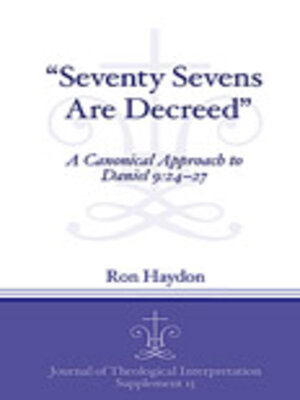"Seventy-Sevens Are Decreed"
ebook ∣ A Canonical Approach to Daniel 9: 24–27 · Journal of Theological Interpretation Supplements
By Ron Haydon

Sign up to save your library
With an OverDrive account, you can save your favorite libraries for at-a-glance information about availability. Find out more about OverDrive accounts.
Find this title in Libby, the library reading app by OverDrive.



Search for a digital library with this title
Title found at these libraries:
| Library Name | Distance |
|---|---|
| Loading... |
Few passages in the Old Testament are as enigmatic as Daniel 9:24-27. It makes sense, therefore, that a myriad of interpretations surround these four verses. Expanding on Brevard Childs's brief work on Daniel, Haydon responds to this question with a canonical approach to Dan 9:24-27: reading a text that is shaped to include future generations of faithful interpreters. The first part lays the groundwork for a canonical approach. Whereas most biblical scholars read Daniel 9 through the lens of historical- and composition-critical tools, Childs and his readers frame the chapter within the larger theological message of the book. The second section is an interpretation of 9:24-27 in its canonical context, doing exegetical and theological work in tandem.
Daniel 9:24-27 is, of course, an apocalyptic text leading the reader through the Antiochene crisis and beyond. The theology of the chapter, however, asks us to look back to the Law and the Prophets: Leviticus 25-26 and Jeremiah 25-29 are integral to Daniel 9. Traditions begun in the preceding corpora—rest, sin-debt, and kingdom (Lev 26:34-35; Jer 25:10-12, 29:10-14)—find their culmination in Dan 9:24-27. Haydon's study brings these texts to bear on the "seventy sevens" in Daniel 9:24. After a careful study of the phrase's background, we discover that the construction refers to more than a number or even a single event. This time-image points to a larger pattern of rulership wherein leaders rise and fall (vv. 25-26), while the Ancient of Days remains the true King. Ambiguity also plays a part: Daniel 9:24-27 lacks historical detail for a reason—namely, to create an interpretive space that a faith community can occupy. The final form of Dan 9:24-27 is a theological construct allowing multiple generations to live in expectation of God's rule. A biblical theology of Daniel 9:24-27, moving into the New Testament and contemporary Christian reception, concludes Haydon's study.







